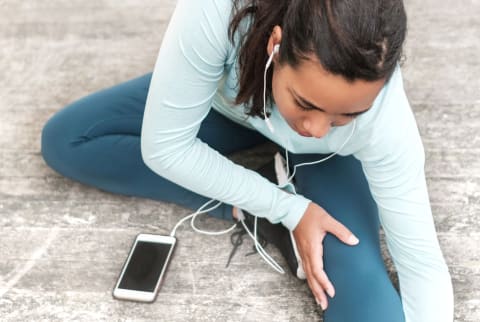Advertisement

As you're lowering down into the final squat of your strength training session or completing one last roll-up during Pilates, your working muscles might begin to quiver uncontrollably.
To help you get the most out of your workout, your lifting partner or instructor may encourage you to push through those tremors. But is that a good idea?
Here, a personal trainer breaks down why you're trembling throughout your training session and whether these shakes are actually a sign of a job well done.
Why your muscles shake during exercise
A few things can cause your muscles to quiver, says Jill Goodtree, a NASM-certified personal trainer and Rumble Boxing instructor.
First, this may simply mean your muscles are fatigued and nearing their breaking point at the end of your workout. "When your body creates shakes, it can be your muscles saying, 'I'm tired! I need help! I'm going to recruit more muscle fibers to help me,'" she notes.
Shaking can also occur when you're learning a new movement. If you've never performed a pullup, for instance, your first few reps may be unsteady until your body acclimates to the exercise, says Goodtree.
More seriously, trembling muscles can also be caused by dehydration, says Goodtree. Dehydration, which occurs when you're not replacing the fluids you're losing via sweat during physical activity, can affect your attention and cognitive performance1 and also reduce the efficacy of your workout, according to the American College of Sports Medicine.
Plus, research suggests that cell dehydration may impair muscle contractile capacity2 (read: muscle cells' ability to forcefully contract).
So, is shaking muscles a good sign?
It all depends on the reason behind your trembling. "If your muscles are shaking because of fatigue (for example, you are holding a plank for 60 seconds and they shake for the last 10 seconds), that can be good," says Goodtree. "Shaking in that scenario is your muscles working harder to build strength."
That said, you'll need to be sure to maintain good form, as a compromised technique could increase your risk of injury, she adds. "If you continue with a workout and your form is sacrificed due to shaking, stop," says Goodtree. "You're not building strength—you're risking injury."
For instance, muscle trembling that affects your ability to do a proper bench press could lead to a barbell falling onto your chest if you're lacking a spotter. As a general rule of thumb, you can continue with your workout if you're shaking during the last two to three reps of a set and you're maintaining good form, she suggests.
As a general rule of thumb, you can continue with your workout if you’re shaking during the last two to three reps of a set and you’re maintaining good form
Quivering caused by dehydration, however, isn't something you should push through. "If you're shaking due to dehydration, stop exercising, consume water or an electrolyte beverage, and seek medical help if necessary," says Goodtree. If you're feeling tired, lightheaded, dizzy, or thirsty, or you have dry skin and lips, muscle cramps, or a headache—common signs3 of dehydration—that's your cue to pause your workout and replenish any lost fluid.
Although shaking during your workouts isn't always a red flag, you shouldn't necessarily strive to quiver, either. "As a fitness professional and personal trainer, I don't think 'get my muscles to shake' is an effective goal," says Goodtree.
Instead, set SMART (Specific, Measurable, Achievable, Relevant, and Time-Bound) goals for your fitness program, she suggests. A person who can't yet do a full pushup, for example, might set a goal to complete 10 pushups on their toes within two months. "To get there, you might work on your chest press, chest fly, planks, and shoulder mobility," she recommends. "You also might experience muscle shaking along the way!"
How to keep your muscles and joints healthy
Resistance training—an activity that might make your body tremble—plays a key role in keeping your muscles and joints healthy, particularly as you get older. Muscle mass and strength typically begin to decline after age 35, but making strides to maintain them can help support4 your daily functioning and independence and reduce your risk of injury.
Along with lifting weights and performing body-weight exercises, you can support your muscle and joint health by engaging in other types of physical activity, such as swimming, playing tennis, or dancing, according to the National Institutes of Health. What matters most, says Goodtree, is choosing a movement practice you enjoy.
Nutrition is equally important. Remember to stay hydrated before, during, and after your workout, suggests Goodtree.
You may also consider taking a collagen supplement, which some research suggests5 may improve osteoarthritis symptoms. Here's a comprehensive list of supplements that can support joint health as you age. Above all, eat a well-rounded diet with enough protein, carbohydrates, and healthy fats to carry you through your strenuous—and perhaps a bit shaky—workouts.
The takeaway
Muscle shaking during a workout can happen when you're doing a new move, completing a challenging rep, or in need of some hydration.
Quivering is not necessarily a red flag (as long as you're not dehydrated), but fitness pros note that it's not something to aim for, either. If you do find yourself shaking during a workout, be sure to properly refuel afterward.